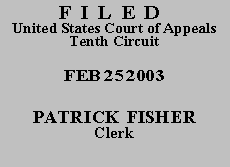

| MICHAEL GIRON,
Plaintiff - Appellant, v. GARY E. JOHNSON, Governor of New Mexico; DEPARTMENT OF CORRECTIONS, NEW MEXICO; ROBERT J. PERRY, Secretary of Corrections; JOHN SHANKS, Director of Adult Prisons; ELMER BUSTOS, DOC, Classification Director; JEFF SERNA, Interstate Compact Coordinator; JERRY TAFOYA, Deputy Corrections Secretary, Defendants - Appellees, and VIRGINIA DEPARTMENT OF CORRECTIONS; RONALD ANGELONE, Virginia Corrections Director; STANLEY K. YOUNG, Wallens Ridge State Prison Warden; C O COCHRANE, WRSP, Correctional Officer; C O NECESSARY, WRSP, Correctional Officer; JOHN DOES #1-3, Virginia Corrections Officers, Defendants. |
|
Plaintiff Michael Giron appeals the district court's dismissal of his civil rights complaint filed pursuant to 42 U.S.C. § 1983. Mr. Giron, a former New Mexico state prisoner, sought damages on several claims stemming from his transfer to a maximum security prison facility in Virginia. Mr. Giron failed to serve defendants Virginia Department of Corrections, Angelone, Young, Cochrane, Necessary, and three unknown Virginia corrections officers and those defendants were subsequently dismissed. The remaining defendants filed an answer, followed by five motions to dismiss Mr. Giron's actions for failure to state a claim under Fed. R. Civ. P. 12(b)(6). Mr. Giron, who was represented by counsel, failed to respond to the motions and the district court subsequently dismissed Mr. Giron's complaint with prejudice. After the court entered judgment against him, Mr. Giron filed neither a motion to alter or amend the judgment pursuant to Fed. Rule Civ. P. 59, nor a motion for relief from the judgment pursuant to Fed. R. Civ. P. 60. Instead, Mr. Giron appealed directly to this court. We review dismissals pursuant to Fed. R. Civ. P. 12(b)(6) de novo. Stidham v. Peace Officer Standards & Training, 265 F.3d 1144, 1149 (10th Cir. 2001).
For the first time on appeal, Mr. Giron raises several issues alleging procedural irregularities in the filing and disposition of the motions to dismiss. "Generally, an appellate court will not consider an issue raised for the first time on appeal." Tele-Communications, Inc. v. Comm'r, 104 F.3d 1229, 1232 (10th Cir. 1997). While we have recognized exceptions to this general rule, those exceptions
are rare and generally limited to cases where the jurisdiction of a court to hear a case is questioned, sovereign immunity is raised, or when the appellate court feels it must resolve a question of law to prevent a miscarriage of justice. The failure to raise the issue with the trial court precludes review except for the most manifest error.
Hicks v. Gates Rubber Co., 928 F.2d 966, 970 (10th Cir. 1991) (citations omitted); see also Lyons v. Jefferson Bank & Trust, 994 F.2d 716, 721 (10th Cir. 1993) (stating that this court "hear[s] issues for the first time on appeal only in the most unusual circumstances"). "The policies behind the general rule and its narrow exceptions include respect for the [district] court, unfair surprise to the other party, and the need for finality in litigation and conservation of judicial resources." Tele-Communications, Inc. v. Comm'r, 12 F.3d 1005, 1007 (10th Cir. 1993) (quotation omitted). The decision to take up questions for the first time on appeal is left primarily to this court's discretion, based on the facts of individual cases. Singleton v. Wulff, 428 U.S. 106, 121 (1976).
In the present case, Mr. Giron did not respond to defendants' motions to dismiss. Moreover, after the district court entered judgment against him, Mr. Giron did not file any post-judgment motion to alert that court to his allegations of error. Finally, in his brief on appeal Mr. Giron does not address the appellate waiver issue and offers no reason why we should grant an exception to the general rule in this case. After independently reviewing the record, as well as the merits of the issues Mr. Giron seeks to raise on appeal, we see no basis for such an exception and we exercise our discretion to decline consideration of those allegations that should have been raised initially in the district court.
The judgment of the United States District Court for the District of New Mexicois AFFIRMED.
Entered for the Court
Circuit Judge
*. This order and judgment is not binding precedent, except under the doctrines of law of the case, res judicata, and collateral estoppel. The court generally disfavors the citation of orders and judgments; nevertheless, an order and judgment may be cited under the terms and conditions of 10th Cir. R. 36.3.